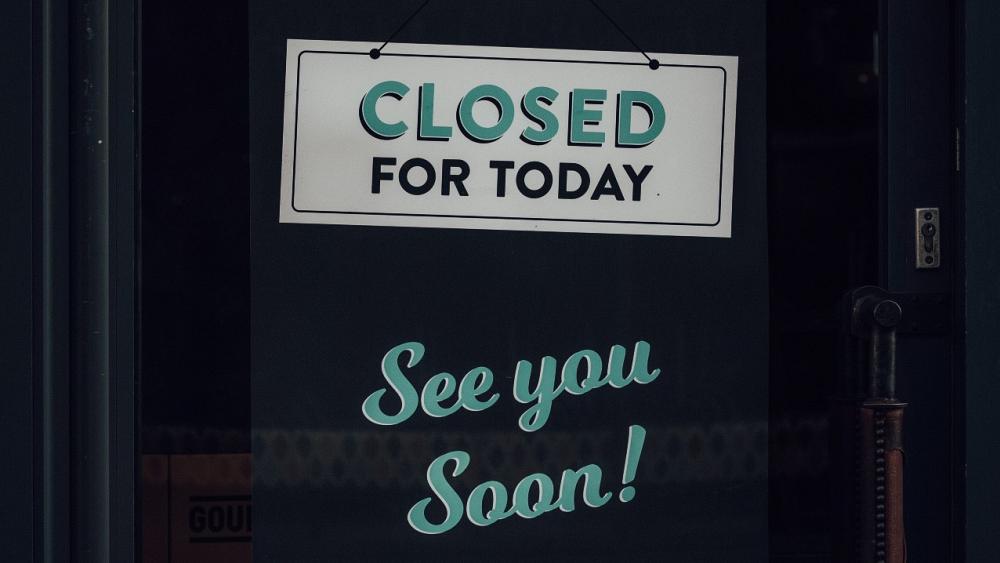“We felt like we were watching a movie. We were like: ‘This looks kind of bad…’,” Romanian restaurant owner Razvan Crisan said of the moment he learned the pandemic had reached their country and their businesses would have to close.
Restaurants big and small have been rocked by the coronavirus pandemic — the jolt to the sector has been far-reaching.
In most European countries, restaurants are closed to sit-in diners with uncertainty over when that restriction might be lifted.
With many of them small or medium-sized businesses, restaurants, edging further and further into the red, are forced to rely on the temporary supportive measures being provided across the continent.
The eurozone economy went spiralling into a double-dip contraction in the final quarter of 2020, which meant last year saw its biggest-ever shrink post-war.
While the area saw a slump in the registration of new businesses and a rise in those filing for insolvency after the first European lockdowns in the second quarter of 2020, the results didn’t seem to last and declarations of bankruptcies fell in the third quarter, according to experimental data from Eurostat.
Governments pouring money into businesses, including restaurants, in the form of subsidies, grants and loans to save their economies was a key factor for many being able to survive.
But Crisan cautioned that while his government had, on paper, offered an attractive aid package totalling €800 million to all companies, including those in the hospitality sector, “the money never came”.
As Europe’s restaurateurs endure second and some cases third lockdowns, many have had to dip into reserves or be creative in thinking of initiatives to boost their turnovers, while others have managed to hang on and in some cases are happy with the money they have received from the sate.
Cuffnews spoke to three restaurant owners to get their take on how they and their contemporaries are managing after nearly one year of COVID-related measures.
Who is investing most in restaurants on paper?
Experts at Latham & Watkins lawyers pulled together data exclusively for Cuffnews on state aid granted to the hospitality sector in European countries up until February 17, 2021.
‘You’re starting to see independent restaurants closing’ – Romania
“We are the worst by far in Europe in supporting small businesses that are out of business,” Crisan said about Romania.
Co-founder of the Kane group of restaurants in Bucharest and vice-president of Romania’s restaurant association (HORA), he owns three premises, one offering new Romanian cuisine (Kane), a pizzeria (Mamizza) and an open-air garden. His team was set to open another two projects in 2020 that were not possible.
Crisan said the first state payments to restaurants, for the March-May 2020 period, which he estimated were paid to just 20% of applicants, only started to arrive in October.
In November, it would have been hard for me to say any restaurants had closed – people were hanging on. Now I’m starting to see people I know in business closing.
“We’ve heard it all,” he added. “We’ve heard that it’s difficult because they don’t have a good infrastructure. And we were really tired of hearing all this stuff.”
Aid during the pandemic in Romania started out promisingly, the restaurateur explained, with furlough payments arriving promptly for employees and an announcement that taxes could be postponed to March 25, 2021.
“They made this work quite easily,” he said, but the system to put off paying taxes turned out to be a case of the government “cleaning the house and moving the dust to another room”.
“Everyone is going to have a problem. The larger you are, the larger the headache when you finally have to pay the taxes,” he explained. “The expiration date is approaching and we’re talking about huge amounts that need to be paid here. They keep postponing a problem, which is getting bigger and bigger.”
What does the future hold for the restaurants of Bucharest?
“If you had asked me this question in November, it would have been hard for me to say any restaurants had closed — people were hanging on, they had quite a good summer.
“Now I’m starting to see people I know in business starting to close. You’re starting to see independent restaurants closing.”

‘I’ve been pleasantly surprised’ — France
While many restaurants in France have been battered by COVID restrictions and closures, Hugo Richier’s fledgeling operation didn’t even get out of the starting blocks before he was forced to shut up shop.
The day the French government ordered restaurants to close was the day his small 20-seat bistro in Paris’ 11th arrondissement, Terre Restaurant, was meant to open its doors for the first time.
Richier had a tumultuous start with government aid — the grants he was eligible to apply for were based on 2019 revenues, which he didn’t have, and the only help he got from the state was furlough and exemption from social security payments for the one staff member he had already employed before they had even had a chance to do up their apron.
“The first three months were pretty difficult,” he told Cuffnews, “but the landlord, the bank, and my suppliers played ball. The bank agreed to postpone the start of my loan repayment, so that gave me a bit of breathing space and the landlord let me put off paying my rent. It wasn’t a freebie, but I know a lot of people weren’t so lucky.”
I can tell you that when this pandemic is over, if it weren’t for that (aid from the French government), it would be very, very difficult for me.
But by the second wave of the pandemic in October, Richier was able to access France’s “solidarity fund” and receive the full €10,000 on offer.
“I was pleasantly surprised,” he explained. “They (the government) put in place the necessary measures for us to get access pretty quickly.”
The restaurateur, however, has to provide “a tremendous amount of documents” to get the payments, which he attributes to a lot of people taking advantage of the system when it was first launched.
He added that applications for the monthly grants can only be carried out the following month and, while in simple cases it can be in people’s banks in “less than a week, it can take up to a month to arrive in special cases like his own.
“It’s not easy, but if you’re attentive and follow what’s being announced, you can get by quite well. France has supported its tradespeople like me and I’m rather grateful. I can tell you that when this pandemic is over if it weren’t for that (aid from the French government), it would be very, very difficult for me.”
“Saying that the state is the one imposing these administrative closures on us, and therefore they have to take responsibility when they make these sort of decisions.”
‘Aid helped, but wasn’t enough’ — Hungary
A Hungarian restaurant owner, who wished to remain anonymous, said that while his two fine dining businesses in Budapest received aid from different government schemes, it “would not have been enough to keep the business alive”.
“Restaurants still heavily rely on financial support from their owners,” he added.
His group has two restaurants; one with 42 seats and 18 staff had to close right after COVID restrictions were announced in Hungary in mid-March and has remained closed since then.
The other has 68 seats and 50 staff and could remain open for a bit longer because it serves a hotel and opens whenever restrictions are relaxed, mainly for the hotel’s few guests.
“Apart from a period of three months from June to August 2020, when the travel restrictions were eased, the business has been very slow and restricted,” he explained.
It is going to be at least two very tough years for restaurants.
He could mitigate some of his losses via a number of aid schemes including waiving tax and reducing VAT for the takeaway service he set up, as well as subsidising the wages of employees up to 50%, which “pretty much all companies in this industry welcomed and used”.
But while the gross wage of the staff was partially subsidised by the government, the service charge, which represents a major part of the employees’ salaries, was not. This meant the owners had to spend considerable amounts every month to retain their staff. “In our case, less than 15% of the staff’s salary was covered by the government’s supportive actions.”
“It is going to be at least two very tough years for restaurants, as business is expected to pick up slowly,” the Hungarian restaurateur said.
“We are also working on taking a bank loan to ensure that the business survives.”
“We have been trying to diversify the services offered to the guests and the company and its staff and management have become very agile during the past year, which will definitely help our chances in the long run, supposing that we survive the challenging times ahead.”

